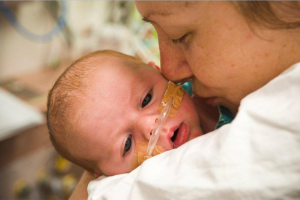If you’ve ever had a child in special care nursery (SCN), neonatal intensive care unit (NICU), or the paediatric intensive care unit (PICU), you’ll know that it’ a world like no other. It brings with it a whole new way of caring for your child, and it puts your life on hold. Little exists out of that hospital room. You’ll even start speaking a new language – discussing de-sats and bradys while doing cares will become second nature.
For many people, leaving your precious child at the hospital can feel like you’re leaving your heart there. The time my triplets spent in SCN and, later, PICU, was the hardest time of my life. And I know that I’m lucky that the time they spent in hospital wasn’t longer. But the sounds and scents are something that will remain with me forever. From living my own journey and speaking to many others who’ve been through it, I have compiled a list of things that will hopefully help make this time even a tiny bit easier.
ASK FOR A TOUR OF SCN/NICU/PICU
If you know in advance that your child will be spending time in hospital, don’t hesitate to ask for a tour. Seeing all of the cords, tubes and monitors will help so that it’s a little less overwhelming when they’re attached to your child. Ask what they are so that you have a bit of preparation. Tubes coming from their nose and mouth aren’t necessarily as daunting as they may seem. It’ll still cause you heartache, but at least there’ll be a bit of understanding as to how those things are helping.
TALK TO THE HOSPITAL STAFF
The nurses will become an extension of your family. They’re doing everything they can for your child so that you’ll be able to take him or her home, hopefully soon. They can translate things that the doctors have told you and ask them questions on your behalf. They will let you cry on their shoulder whenever you need it. They expect it as a part of their job. The first time it happened to me, the nurse hugged me back and said that seeing my tears just showed how much I loved my children, and what a beautiful thing that was. Hearing those supportive words at that time meant a lot. And that’s what SCN/NICU/PICU nurses do.
Your hospital will also have a social worker on staff. They can be great to talk to if you’re needing extra support, but they can also help out with logistical things like the cost of parking, as well as being an advocate if you have any questions or issues. Let them help you – it’s their job to do so.
ACCEPT HELP
Don’t just accept help from the hospital staff. Lean on your family and friends too. Chances are that if they haven’t been there themselves, they won’t truly understand. But those closest to you will try to. Let them help you out by dropping off some meals or shopping so that you don’t need to worry about getting to the supermarket. Things like that sound small but will help out more than you may realise.
TAKE IT ONE DAY AT A TIME
Don’t look too far in to the future. Try not to focus on when your child will be coming home. No matter how soon it is, it will still feel like it’s a lifetime away. Try to focus on getting through each day. Celebrate each milestone, no matter how tiny. Setbacks happen to most children, even if it’ s just something like being exhausted and having to go back to relying solely on NG feeds for a few days. That’s okay. If their doctor reassures you that it’s common, believe them. They wouldn’t say something untrue just to make you feel better.
Set yourself little goals for each day. It could be something like spending some time skin to skin in a kangaroo cuddle. It could be getting a bit more milk from your pumping sessions. It could even just be taking some video of your child to watch when you’re at home that night. Having little things you can focus on and achieve will help give you back some of the control you may miss in this uncertain time. Just remember not to set your sights too high. Be kind to yourself.
PERSONALISE THEIR TEMPORARY HOME
If their doctors permit, personalise their area. Take in clothing, blankets, and pictures from home. When my babies weren’t allowed things in their isolettes, I placed a picture of our family on the outside of it (in a place where it wouldn’t obstruct the nurse’s view). Once they were in open cribs, they wore their own clothes, had their own blankets, and had a teddy sitting in the corner near their feet. Ask the nurses for guidance on what you can do to make their little section of hospital feel more homely.
If you do take blankets in, give those blankets plenty of cuddles first. Even sleep with them, if you have enough notice. Your scent will then be on the blanket so that your child will feel you closer. And in the same vein – take one of their blankets home with you. Having their scent may help comfort you, and, if expressing, may help your pumping sessions.
ALLOW YOURSELF TO REST
You aren’t a superwoman. You need to rest, and it can be very hard to remember that when you get caught up in the hospital routine, especially if you’re waking up overnight to express milk. If you need to take some time away from the hospital, that’s okay. You need to look after yourself. You are no good to your child if you become exhausted, rundown and sick. Try to remember that to ease the guilt you’ll inevitably feel. Call the nurses for an update, and then have a nap, or have something delicious to eat. It will help you (and your milk production), which will in turn help your child.
ALLOW YOURSELF TO FALL APART
Don’t ever feel that you have to hold yourself together all of the time. It’s absolutely okay, and absolutely normal, to fall apart. If you’ve just given birth, you have the additional whack of postnatal hormones making this journey a little crazier. You will likely fall apart a few times, and that’s okay. It doesn’t make a difference whether your child is there for a few days, and the child next to yours has been there for a few months. Don’t feel that you can’t break down because somebody else seemingly has it “worse”. You’re living your own journey and it’s a heartbreaking one, no matter how short. It won’t help you or your child to bottle it up, so cry and let it all out.
If you do feel like you’re really struggling, talk to someone. Your partner, the nurses, the social worker, and the doctors will all listen. There are also many support groups you can reach out to. As well as the links below, many of the bigger hospitals have their own online support groups. If your child has a known or suspected condition, there will likely be an online support group for that too. It can be so helpful to speak to people who have been through the same journey you’re going through.
Helpful Resources:
Life After NICU: An American website, but an active supportive online community













